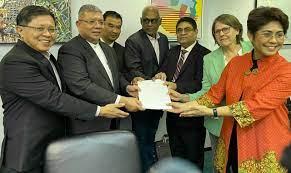
https://aseanmp.org/2022/09/19/malaysian-foreign-minister-and-internatio...
Minister Abdullah hosted a meeting focused on Myanmar today at the Malaysian Permanent Mission to the United Nations in New York, on the sidelines of the UN General Assembly, which is taking place this week.
“There should be an inclusive and fair consultation with all stakeholders in Myanmar, including the NUG and NUCC. Then there should be a framework with a clear endgame, which includes a return to democracy in Myanmar,” Abdullah said.
Abdullah is the only ASEAN minister who has publicly met with members of the NUG, the legitimate government in Myanmar, which represents the democratic aspirations of the country’s people. The meeting was attended by the NUG Minister for Human Rights, U Aung Myo Min; the NUG Minister of Communications, Information and Technology, as well as its spokesperson, U Htin Linn Aung; the permanent representative of Myanmar to the UN, Kyaw Moe Tun; as well as representatives of other Myanmar pro-democracy organizations.
“The Myanmar people deserve to have their true representatives at the table where regional decisions are being made,” said Htin Linn Aung.
The meeting was attended by Heidi Hautala, Vice President of the European Parliament and Chair of the International Parliamentary Inquiry (IPI) into the global response to the crisis in Myanmar; Charles Santiago, Malaysian MP and Chairman of ASEAN Parliamentarians for Human Rights; Mercy Chriesty Barends, member of the Indonesian House of Representatives; and Tom Villarin, former congressman from the Philippines.
Since the coup d’état on 1 February 2021, Myanmar has been plunged into a deep crisis, as the military junta led by Senior General Min Aung Hlaing engages in an all-out war against its population in order to cement its power. A massive civil disobedience movement has demonstrated that the vast majority of the country’s population does not wish to live under military rule and has valiantly resisted the power grab. Meanwhile, international attention has largely shifted to crises elsewhere.
“Nineteen months after the coup, the international allies of the junta have shown a commitment to supporting Min Aung Hlaing which surpasses that of those countries claiming to support the pro-democracy movement. Simply put, the latter are not doing enough to help the Myanmar people, as countries like Russia or China actively support the military, engage the junta and give it the recognition it so keenly craves. It is high time for those governments that claim to support democracy in Myanmar to act forcefully,” said Charles Santiago.
In order to assess the global response to the crisis in Myanmar and offer recommendations on what international actors should do to support democracy and human rights in the country, APHR launched the International Parliamentary Inquiry on Myanmar in June. Chaired by Heidi Hautala, Vice President of the European Parliament, the IPI Committee is formed by eight parliamentarians from seven countries in Africa, the Americas, Asia, and Europe.
The IPI has held a total of six public oral hearings, as well as two special and three confidential oral hearings, with experts, diplomats, politicians, and activists from Myanmar and other countries. IPI committee members also conducted a fact-finding mission to the Thai-Myanmar border in August, where they met with over a dozen civil society organizations and other stakeholders. On the occasion of the UN General Assembly, the IPI has sent a delegation to New York and Washington, in order to present its preliminary findings. The IPI final report will be released in November.
The IPI members are presenting a position paper to a variety a stakeholders in New York and Washington, in which they assert that the coup has failed in the face of widespread popular opposition. Myanmar has been plunged into a civil war between the military and the pro-democracy movement, which is bound to be long and protracted.
“As the conflict in Myanmar remains undecided, and the coup is triggering a humanitarian crisis of an enormous scale, what international actors do, or fail to do, may tip the scale in favor of military dictatorship or democracy. We urge the global community to scale up humanitarian aid, to increase the pressure on the junta through improved coordination on sanctions and diplomatic isolation. We further urge international actors to fully acknowledge the NUG as what it is, the legitimate government of Myanmar, and support it accordingly with funding, capacity building initiatives, and diplomatic recognition,” said Heidi Hautala.










Add new comment